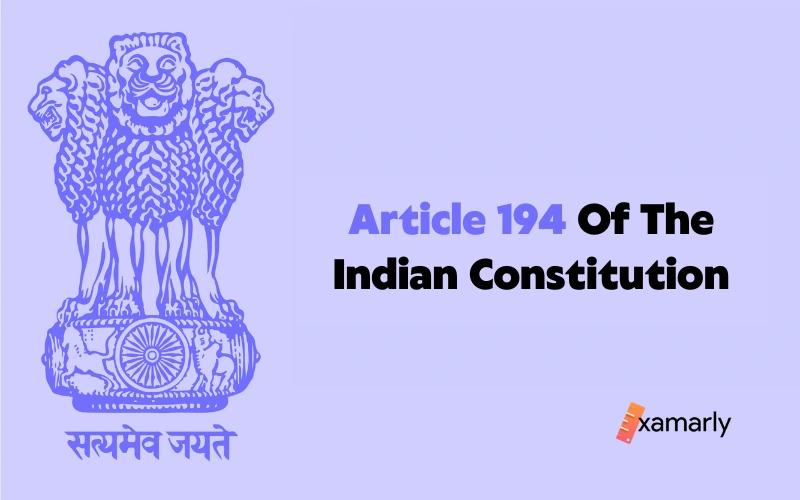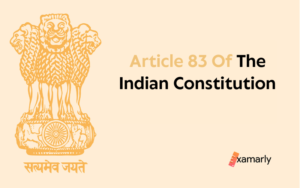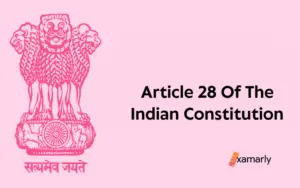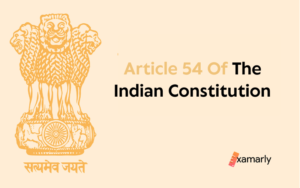The Constitution of our country grants certain powers and rights to its citizens and to the people who represent these people.
Article 194 Of The Indian Constitution guarantees certain powers, advantages, and immunities to the members of the Houses of the Legislature of a State, the committees, and the legislative body itself.
This article takes a detailed look at Article 194 of the Indian Constitution, the provisions it provides through its different clauses, and the constitutional amendment it is related to. Read on to grasp the concept behind the formulation of this article.
- Background Of Article 194 Of The Indian Constitution
- Article 194 Of The Indian Constitution: Provisions For The Privileges Of Members Of The State Legislature
- Clause (1) Of Article 194 Of The Indian Constitution: Explained
- Clause (2) Of Article 194 Of The Indian Constitution: Explained
- Clause (3) Of Article 194 Of The Indian Constitution: Explained
- Clause (4) Of Article 194 Of The Indian Constitution: Explained
- Amendments Related To Article 194 Of The Indian Constitution
- Summing Up
- FAQs Related To Article 194 Of The Indian Constitution
- Who Are The State Privileges That Are Bestowed Upon The Members Of The State Legislature?
- What Was The Draft Article For Article 194 Of The Indian Constitution?
- When Was Draft Article 169 Debated In The Constituent Assembly?
- Which Article Of The Indian Constitution Contains Provisions For Providing Parliamentary Privileges?
- What Is Meant By The Houses Of The Legislature Of A State?
- How Many Clauses Are Included In Article 194 Of The Indian Constitution?
- Are There Any Sub-clauses In Article 194 Of The Indian Constitution?
Background Of Article 194 Of The Indian Constitution
Before delving straight into the contents of the provisions of Article 194, let us take a look to familiarise ourselves with its background and understand how the article took its form.
Draft Article 169 was introduced in the Constituent Assembly for the debate on Article 194. It was debated on two different dates.Both June 3, 1949 and October 16, 1949 were devoted to discussion of the Draft Article 169 which was intended for the purpose of formulating Article 194 of the Indian Constitution. Members of the State Legislature were granted a variety of privileges and immunities as a result of this provision.
A member suggested the amendment of this Draft Article. The modification would be in order to extend the privileges and immunities to individuals who participate in committees that are set up by either House of the State Legislature. This would allow these individuals to act freely and without reservation. It would not hamper the smooth functioning of either of the Houses of the Legislature of a State that they are a member of, while they are carrying out their responsibilities. This modification was approved with no criticism at all from the other members.
Another member voiced their worry with clause (3). This clause of the article described the immunities in a manner that was comparable to those of the immunities and privileges afforded to members of the House of Commons in the United Kingdom. He therefore, advocated the establishment of a Schedule that would define the rights and immunities enjoyed by members of both Houses of the Legislature of a State.
However, the Chairman of the Drafting Committee was against this suggestion. It was suggested by him that specifying all of the potential immunities and privileges would make the Constitution too long to include in its final form.
The revised version of the Draft Article was approved to be put to use. It was done on June 3, 1949.
Following this event, another member of the Drafting Committee suggested the substitution of clause (3) of Article 194 of the Indian Constitution. He reported that a similar alteration to Draft Article 85 ( for Article 105 of the Indian Constitution) had been agreed to. It was regarding the immunities and privileges for the Members of Parliament.
On October 16, 1949, this amendment was approved. It was done so without any debate taking place.
Article 194 Of The Indian Constitution: Provisions For The Privileges Of Members Of The State Legislature
The advantages associated with being members of either of the Houses of the Legislature of a State has been contained in article 194 of the Indian Constitution. The provisions of this article are contained in four clauses.
We will take a look at each of the four clauses one at a time as stated in the Constitution of India and at the same time try to break down the provision it provides by closely analysing it.
Clause (1) Of Article 194 Of The Indian Constitution: Explained
(1) Subject to the provisions of this Constitution and to the rules and standing orders regulating the procedure of the Legislature, there shall be freedom of speech in the Legislature of every State.
The introductory clause of this article says that every member of the State Legislative Assembly (Vidhan Sabha) and the State Legislative Council (Vidhan Parishad) shall be granted the right to voice out their opinion, share their thoughts, criticise the government in a respectable manner, etc during any session of Legislature on vital issues. They are entitled to exercise the freedom of speech. However, they must not misuse this right for any kind of derogatory speech, hate comment or any such remarks that might hurt the sentiments of others.
There must be freedom of expression in the Legislature of every State. It has to be ensured that this freedom is subject to the requirements of this Constitution as well as the rules and standing orders that regulate the conduct of the Legislature.
Clause (2) Of Article 194 Of The Indian Constitution: Explained
(2) No member of the Legislature of a State shall be liable to any proceedings in any court in respect of anything said or any vote given by him in the Legislature or any committee thereof, and no person shall be so liable in respect of the publication by or under the authority of a House of such a Legislature of any report, paper, votes or proceedings.
The second clause of this article explains that anything spoken by any member of either of the Houses of the Legislature of a State or a vote that has been cast for or against by a member in any of the meetings of the House shall not be used in any court as a testimony in any case. The opinion of the members shall be respected and not used against them. If relation to reports and their submissions, the words of the committee members must not be presented in a manner that brings them any sort of harm.
In simple words, no member of either of the Houses of the Legislature of a State can be sued in court. They shall not be held accountable for anything they said or voted on in the Legislature or a committee of the Legislature. The same goes for anyone who publishes a report, paper, vote, or proceedings by or with the permission of a House of the Legislature.
Clause (3) Of Article 194 Of The Indian Constitution: Explained
(3) In other respects, the powers, privileges and immunities of a House of the Legislature of a State, and of the members and the committees of a House of such Legislature, shall be such as may from time to time be defined by the Legislature by law, and, until so defined, (shall be those of that House and of its members and committees immediately before the coming into force of section 26 of the Constitution (Forty-fourth Amendment) Act, 1978).
The third clause of Article 194 throws light on the powers, advantages, and the immunities that have been allocated to the members and the committees of either of the Houses of the Legislature of a State. The authority for defining these factors rests on the shoulders of the State Legislature by law from time to time.
When provisions change in these regard, so will the powers, advantages, and the immunities of the members of the State Legislative Assembly and the State Legislative Council. Until then, they will be the same as they were before Section 26 of the Constitution (Forty-fourth Amendment) Act, 1978, went into effect.
Clause (4) Of Article 194 Of The Indian Constitution: Explained
(4) The provisions of clauses (1), (2) and (3) shall apply in relation to persons who by virtue of this Constitution have the right to speak in, and otherwise to take part in the proceedings of, a House of the Legislature of a State or any committee thereof as they apply in relation to members of that Legislature.
The final clause of the article expands the scope of clauses (1), (2), and (3) of the article as stated above. It clarifies that the first, second, and third clauses apply to people who can speak in and otherwise take part in the work of a House of the Legislature of a State or any of its committees because of this Constitution. The initial three clauses apply to them in the same way that they apply to members of that Legislature.
Amendments Related To Article 194 Of The Indian Constitution
The Constitution (Forty-second Amendment) Act, 1976, had a crucial role to play in the revision of clause (3) of Article 194. The following paragraph has been taken up from the Constitution of India that was substituted in the said clause through the Constitution (Forty-second Amendment) Act, 1976. It says:
“(3) In other respects, the powers, privileges and immunities of a House of the Legislature of a State, and of the members and the committees of a House of such Legislature, shall be those of that House, and of its members and Committees, at the commencement of section 34 of the Constitution (Forty-second Amendment) Act, 1976, and as may be evolved by such House of the House of the People, and of its members and committees where such House is the Legislative Assembly and in accordance with those of the Council of States, and of its members and committees where such House is the Legislative Council.” (date not notified). This amendment was omitted by the Constitution (Forty-fourth Amendment) Act, 1978, s. 45 (w.e.f. 19-6-1979).”
The Constitution (Forty-fourth Amendment) Act, 1978, contains several sections in its Statement of Objects and Reasons. One such section of this constitutional amendment talks about the amendment of Article 194 of the Indian Constitution for a certain portion of the clause. It reads as follows:
Amendment of Article 194.-In article 194 of the Constitution, in clause (3), for the words “shall be those of the House of Commons of the Parliament of the United Kingdom, and of its members and committees, at the commencement of this Constitution”, the words, figures and brackets “shall be those of that House and of its members and committees immediately before the coming into force of section 26 of the Constitution (Forty-fourth Amendment) Act, 1978” shall be substituted.
Summing Up
To summarise everything we learnt from this extensive article is that Article 194 of the Indian Constitution articulates special rights for the members of the Houses of the Legislature of a State.
The purpose of clauses of this Article 194 is to mention about privileges accorded on the members of the State Legislature and the committees thereof. It grants freedom of speech which is a fundamental right, ensures that the concerned person is not penalised in any way, the provisions are time to time defined for the benefit of the members, etc.
These rights are essential to be enjoyed by the Houses collectively as well as the members in an individual manner. This is because these government bodies and its members would not be able to render their duties without these. The forces which work for the people of the country deserve the powers, benefits, and the immunities that are vested upon them.
FAQs Related To Article 194 Of The Indian Constitution
Who Are The State Privileges That Are Bestowed Upon The Members Of The State Legislature?
There are two types of privileges put in place for the members of the Houses of the Legislature of a State. These are the collective privileges and the individual privileges.
What Was The Draft Article For Article 194 Of The Indian Constitution?
Draft Article169 was introduced in the Constituent Assembly for the formulation of Article 194 of the Indian Constitution.
When Was Draft Article 169 Debated In The Constituent Assembly?
Draft Article 169 for Article 194 of the Indian Constitution was debated in the Constituent Assembly on two different dates. The initial debate and approval took place on June 3, 1949.
On a later date of October 16, 1949, the second discussion on clause (3) of Draft Article 169 was held in the Constituent Assembly.
Which Article Of The Indian Constitution Contains Provisions For Providing Parliamentary Privileges?
Article 105 of the Indian Constitution contains provisions for providing privileges for the members of the House of Parliament.
What Is Meant By The Houses Of The Legislature Of A State?
The Houses of the Legislature of a State refers to the State Legislative Assembly and the State Legislative Council.
The State Legislative Assembly is the Lower House and also known as the Vidhan Sabha. On the other hand, the State Legislative Council is the Upper House and it is also called the Vidhan Parishad.
How Many Clauses Are Included In Article 194 Of The Indian Constitution?
Article 194 of the Indian Constitution includes four clauses, namely- clause (1), clause (2), clause (3), and clause (4).
Are There Any Sub-clauses In Article 194 Of The Indian Constitution?
No, Article 194 of the Indian Constitution does not contain any sub-clauses. It only contains four clauses.






